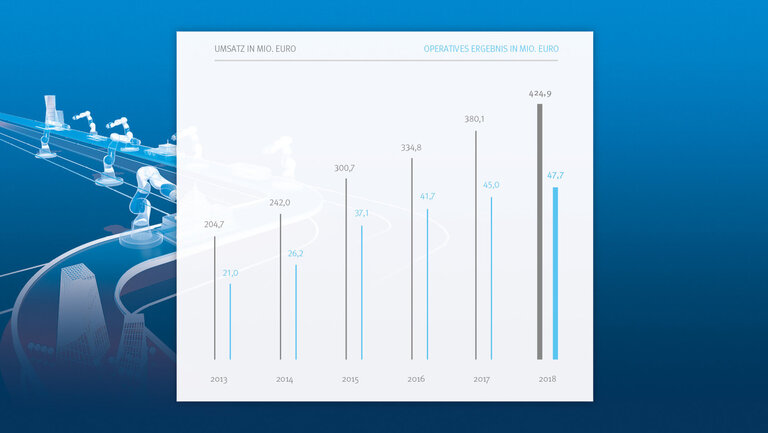The international real estate consulting company Drees & Sommer generated sales of EUR 424.9 million in 2018, a year-on-year increase of almost 12 percent. Its profit was up 6 percent, at EUR 47.7 million. Further growth in the company, which is managed by its partners, is inextricably linked with sustainable and digital buildings.
Steffen Szeidl, Member of the Executive Board of Drees & Sommer SE, commented: ‘Drees & Sommer has also benefited from the very strong real estate markets. However, its growth is based above all on the fact that we are increasingly offering management models for our clients that include management, planning and construction expertise as a package.’ He is convinced that Drees & Sommer’s investment in innovative, digital and sustainable methods and business models mean that it will be able to secure a high market share even in weaker markets.
Sustainable Answers to Raw Materials Shortages, Climate Change, and Traffic and Transport Problems
For Drees & Sommer, its recent acquisitions of stakes in other companies are a particularly important element of its investments for the future. For instance, it has acquired a majority interest in the environmental research and consulting institute EPEA GmbH. This company played a major role in the development of the Cradle to Cradle (C2C) principle, which maintains the quality of raw materials for products, processes and buildings, making buildings into a kind of repository for raw materials. This means that when a building is demolished, most of the materials incorporated into it can be reused on a more or less like-for-like basis for new construction projects.
Cradle to Cradle is increasingly being used in construction practice, and more and more manufacturers of building products are opting for C2C certified products. The first C2C office building using timber-based hybrid construction – The Cradle – is now under construction in Düsseldorf, Germany. And the municipality of Straubenhardt in the German federal state of Baden-Württemberg is a role model for the public sector. It is the first local authority area in Germany to pursue the C2C principle in its new buildings.
EPEA has also carried out projects for other sectors of the economy, and is steadily extending its client list. For a large discounter, for instance, the institute has recently certified the first textile projects developed for the biological cycle.
City of the Future: Houses Like Trees, Cities Like Forests
Drees & Sommer Executive Board Member Dierk Mutschler commented: ‘Houses like trees and cities like forests… by this we mean not only green façades or urban farming, but also cycles of materials in which the waste is used again to manufacture new nutrients, products and buildings. We have to prepare cities for climate change. We have to become greener, to build less on new land, and make a positive contribution to climate policy.’
Drees & Sommer experts at 41 locations around the world are currently developing entire city quarters and providing advice on all aspects of infrastructure and mobility concepts for private and public-sector clients. They call this approach the blue city.
Pioneer in Digital Transformation Through New Business Models
Drees & Sommer has also acquired a minority shareholding in InterfaceMA GmbH, a proptech company based in Berlin that was founded in 2013. The company specializes in the development of software and services for the real estate sector. The common goal of the two companies is to advance data centric solutions in the construction and real estate industry and to develop standardized, efficient interfaces for heterogeneous data formats. These are also intended to benefit owners and investors in addition to asset, facility and real estate fund managers.
Hackathons for Data Security
In the Drees & Sommer Innovation Center, staff are free to work on innovation-related topics with startups, clients, business partners or in research collaborations. The group operates innovation hubs at several locations for this purpose, with various focuses such as intelligent commercial buildings and smart cities, building information modeling (BIM), or new office concepts.
One of the new hubs is the DS HUB building in Stuttgart, a former bookbinding business now modernized and incorporating co-working space. Here, the main focus is on digital business models, collaborations with startups, and data security. This is where the first hackathons were carried out to test and improve the IT security of digital buildings.
Close Involvement in Global Growth Regions
The international expansion of Drees & Sommer remains an important pillar of the company’s success. In addition to the German-speaking area (Germany, Austria and a part of Switzerland), the company is targeting national markets within Europe, including the Netherlands and the United Kingdom. It is also already heavily involved in global growth regions such as Russia, China and the Arabian Peninsula. Clients in key sectors such as automotive, life science, health care and hospitality benefit from the international delivery capacity and networking.
Outlook: Lean, Building Information Modeling (BIM) and Industrial Construction Will Determine the Future
Executive Board Member Dierk Mutschler gave his view on how Drees & Sommer is preparing for building the future: ‘Rather than sticking rigidly to decades-old construction and process flows, we question existing processes and rethink them. Costs can be reduced, construction times optimized and quality improved by the application of lean construction and the digital planning method BIM, by the modularization of construction elements, and by industrial construction. These are measures that also support good architecture. Repeat clients are the best proof of the quality of our work.’
